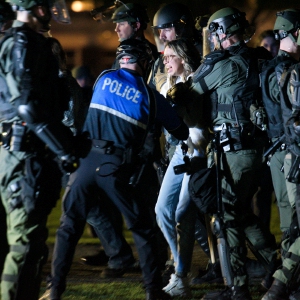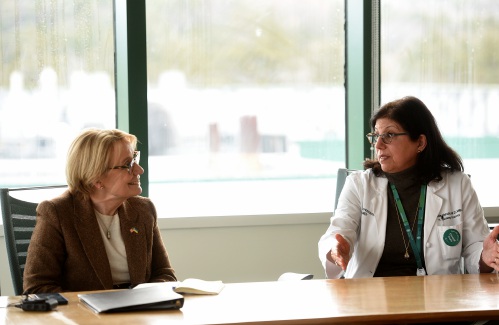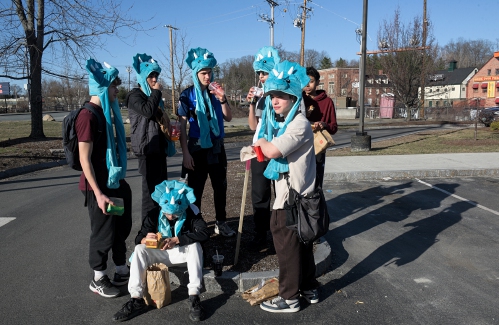
Latest News
 New Hampshire State Police join ICE task force
New Hampshire State Police join ICE task force

Majority of Bradford, Vt. firefighters resign to protest Selectboard’s management
BRADFORD, Vt. — The majority of the volunteer fire department, including the chief, resigned this week in protest of the Selectboard’s effort to expand its oversight over the department.

Judge releases a Palestinian student activist who was arrested at his citizenship interview
BURLINGTON — A judge on Wednesday released a Palestinian student with ties to the Upper Valley who led campus protests against Israel’s war in Gaza and was arrested by immigration officials during an interview about finalizing his U.S. citizenship.
Most Read
 Tree-clearing work near power lines causes Upper Valley outage
Tree-clearing work near power lines causes Upper Valley outage
 Lebanon to close street, block parking to allow outdoor dining
Lebanon to close street, block parking to allow outdoor dining
 Grantham superintendent resigning to become EMT amid rising political attacks on schools
Grantham superintendent resigning to become EMT amid rising political attacks on schools
 Residents disappointed Canaan’s Goose Pond won’t be full in time for summer
Residents disappointed Canaan’s Goose Pond won’t be full in time for summer
 Fairlee Drive-in won’t open for season this summer
Fairlee Drive-in won’t open for season this summer
Editors Picks
 Kenyon: A year later, effects of mass arrests at Dartmouth linger
Kenyon: A year later, effects of mass arrests at Dartmouth linger
 Proposed dog ordinance sparks controversy in Norwich
Proposed dog ordinance sparks controversy in Norwich
 Editorial: Vermont judge defends free speech
Editorial: Vermont judge defends free speech
 A Life: Larry Flint ‘just chose to focus on the positive’
A Life: Larry Flint ‘just chose to focus on the positive’
Sports

High school baseball: Windsor rebuilds while Thetford shines
WINDSOR — Tough times for the Windsor High baseball team. Fresh promise for Thetford Academy.
 Local Roundup: Mascoma baseball narrowly loses to Fall Mountain
Local Roundup: Mascoma baseball narrowly loses to Fall Mountain
 Local Roundup: Lebanon hosts four-team track and field meet
Local Roundup: Lebanon hosts four-team track and field meet
Opinion

Editorial: Free speech detentions reach into Upper Valley
So now the war comes home, as wars always do. This time it’s the dirty war that the American government is waging against immigrants, international students and the rule of law. And home is the heart of the Upper Valley.
 Editorial: New Hampshire budget shortfall is a crisis of Republican design
Editorial: New Hampshire budget shortfall is a crisis of Republican design
 Editorial: Time is running out for American democracy
Editorial: Time is running out for American democracy
 Editorial: Jeanne Shaheen blazed a trail in politics
Editorial: Jeanne Shaheen blazed a trail in politics
 Column: Federal funding for medical research puts America first
Column: Federal funding for medical research puts America first

Your Daily Puzzles

An approachable redesign to a classic. Explore our "hints."

A quick daily flip. Finally, someone cracked the code on digital jigsaw puzzles.

Chess but with chaos: Every day is a unique, wacky board.

Word search but as a strategy game. Clearing the board feels really good.

Align the letters in just the right way to spell a word. And then more words.
Photos

A little off the top
Joel Luis and Danny Sanchez of Olsen Roofing remove shingles on a large barn last week in Orford. Built in the 1800s, the barn is getting a new roof to help preserve the building.
 Winding up a project
Winding up a project
 Capping a class trip
Capping a class trip
 Spring into action
Spring into action
 Spring cleanup
Spring cleanup
Arts & Life

Fairlee Drive-in won’t open for season this summer
FAIRLEE — The Fairlee Drive-in’s towering film screen will remain blank this summer as owner Peter Trapp recovers from an illness.
 Amphibians’ migration routines are getting more difficult. These brigades are trying to help.
Amphibians’ migration routines are getting more difficult. These brigades are trying to help.
 Out & About: Fairlee church to host walk for peace on World Labyrinth Day
Out & About: Fairlee church to host walk for peace on World Labyrinth Day
 Art Notes: Two Upper Valley events to feature video game soundtracks
Art Notes: Two Upper Valley events to feature video game soundtracks
 Sandra Oh to speak at Dartmouth graduation
Sandra Oh to speak at Dartmouth graduation
Obituaries
 Mary Lou Hurd
Mary Lou Hurd
Springfield, VT - Mary Lou (Smolnik) Hurd of Springfield, VT passed away April 26, 2025. Mary Lou was born on January 17, 1942 in Springfield, VT to Wasil Smolnik and Carolyn (Moulton) Smolnik. She was a graduate of Springfield High Sch... remainder of obit for Mary Lou Hurd
 Jean Elva Button
Jean Elva Button
Chelsea, VT - Jean Elva (Goodrich) Button, age 82, passed Thursday, March 13, 2025. A funeral service for Jean will be held on Wednesday, May 7th, 2025 at 2:00pm at the United Church of Chelsea with her burial to follow at the Highl... remainder of obit for Jean Elva Button
 Linda Marie Gallo
Linda Marie Gallo
White River Jct., VT - Linda Marie Gallo, 76, died April 24, 2025, at Rutland Regional Medical Center. Born on March 16, 1949, in Hanover, NH, Linda was the daughter of the late Ralph and Marjorie (Jorgensen) Gallo. She grew up locally... remainder of obit for Linda Marie Gallo
 Merton M. Young
Merton M. Young
Quechee, VT - Merton M. Young, age 88, passed Wednesday, February 19, 2025. Burial will take place at 1pm on Tuesday, May 6, 2025 in the Hilltop Cemetery in Quechee, VT with full military honors. Knight Funeral Home has been entrust... remainder of obit for Merton M. Young

 Local roundup: Hanover shuts out Manchester in girls lacrosse
Local roundup: Hanover shuts out Manchester in girls lacrosse
 Art Notes: New space gives New London arts center first physical home
Art Notes: New space gives New London arts center first physical home
 A Yankee Notebook: Surfing the web to a dream of the ocean
A Yankee Notebook: Surfing the web to a dream of the ocean
 Federal judge approves $11.5 million sale of Vermont’s Burke Mountain Resort
Federal judge approves $11.5 million sale of Vermont’s Burke Mountain Resort
 Vermont’s largest public transit agency weighing new training for its bus drivers on how to interact with federal agents.
Vermont’s largest public transit agency weighing new training for its bus drivers on how to interact with federal agents.
 Judge extends legal protections for Dartmouth student who saw visa threatened
Judge extends legal protections for Dartmouth student who saw visa threatened

 Cross Vermont Trail expands into nearby communities with connector to Lamoille Valley Rail Trail
Cross Vermont Trail expands into nearby communities with connector to Lamoille Valley Rail Trail As spring skiing season winds down, one NH ski area plans to spin its lift until May
As spring skiing season winds down, one NH ski area plans to spin its lift until May
